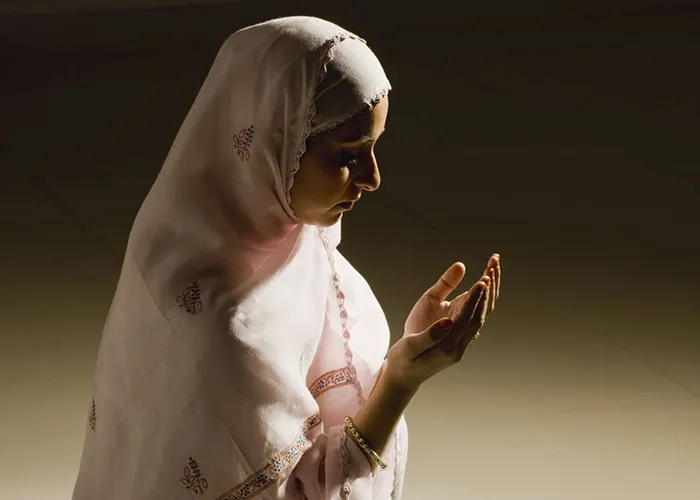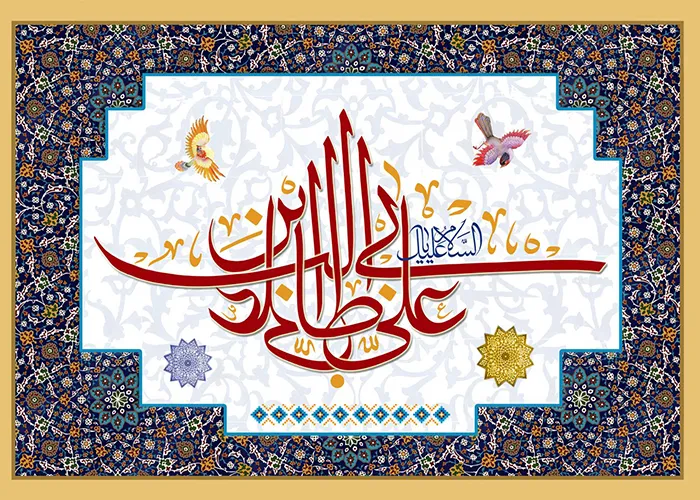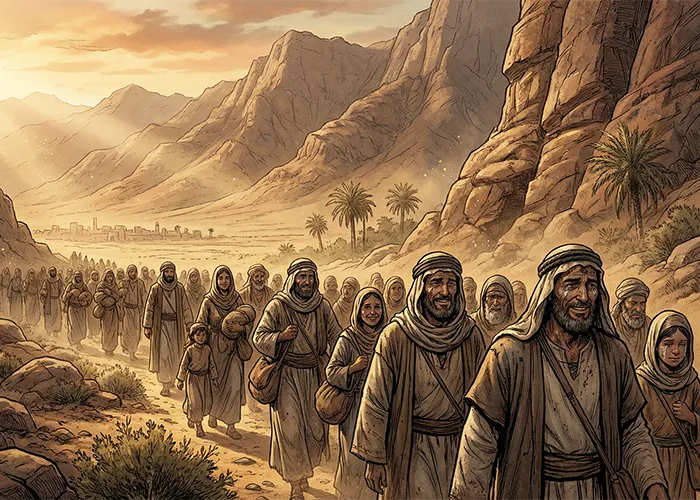Topic of the Week – Volume02 Issue03
Zainab al-Kubra (peace be upon her): The Essence of the Virtues of Ahlul Bayt (peace be upon them)
Seyed Hashem Moosavi
This week, on the occasion of the anniversary of the passing of the great lady of Islam, Lady Zainab al-Kubra (peace be upon her), we dedicate our article to recounting glimpses of the virtues and beauty in the life of this exemplary woman – a personality rarely paralleled in Islamic history.
Lady Zainab (peace be upon her), through her unparalleled courage and resilience in the face of the hardships of the Karbala tragedy, became an eternal role model for all humanity. In every stage of her life – whether as the daughter of Amir al-Mu’minin Ali (peace be upon him) and Lady Fatimah al-Zahra (peace be upon her), or as a sister, mother, and the leader of the caravan of Karbala’s captives – she exemplified faith, piety, knowledge, and self-sacrifice.
By reflecting on the titles attributed to this noble lady, we delve into the various dimensions of her character, including her profound knowledge, eloquence, patience in the face of tribulations, and steadfastness against oppression. These traits establish her as a complete role model for truth-seeking individuals.
Birth of Lady Zainab (peace be upon her)
It has been narrated from Imam Baqir (peace be upon him): “Imam Ali (peace be upon him) married Lady Fatimah (peace be upon her) five months after the migration (Hijrah), during the month of Rajab. The blessed fruits of this union were Imam Hasan, Imam Husayn, Mohsen, Umm Kulthum, and Zainab al-Kubra (peace be upon them all).”
According to what Hassan Muhammad Qasim, an Egyptian writer, mentioned in his book Al-Sayyida Zainab, Lady Zainab (peace be upon her) was born on the 5th of Jumada al-Awwal in the 6th year after Hijrah, two years after the birth of her brother, Imam Husayn (peace be upon him), in the holy city of Medina. [1]
Some other contemporary scholars[2] suggest that her birth occurred in the 7th year after Hijrah, believing it took place after the passing of her maternal aunt, Zainab – a woman for whom Lady Fatimah (peace be upon her) led the funeral prayer.
Lady Zainab (peace be upon her) was less than five years old when her esteemed grandfather, the Prophet of Allah (peace and blessings be upon him and his family), passed away. Shortly thereafter, within 75 or 95 days, she also lost her revered mother, Lady Fatimah al-Zahra (peace be upon her).
Life During the Era of Her Father and Brothers
During the lifetime of her noble father, Amir al-Mu’minin Ali (peace be upon him), Lady Zainab (peace be upon her) married her cousin, Abdullah ibn Ja’far. This marriage was blessed with five children: Ali, Awn, Abbas, Muhammad, and Umm Kulthum.
Lady Zainab (peace be upon her) witnessed the short-lived caliphate of her father and later of her elder brother, Imam Hasan al-Mujtaba (peace be upon him). She endured immense sorrow following the martyrdom of both these great figures. When Imam Husayn (peace be upon him) left Medina on the 28th of Rajab, or as per another narration, the 3rd of Sha’ban in the year 60 AH, intending to go to Mecca, Lady Zainab (peace be upon her) accompanied him. She brought along her children, relatives, and other family members. This arduous journey took them from Medina to Mecca, then to Karbala, and after the tragedy of Ashura, from Karbala to Kufa, Damascus, and eventually back to Medina. These travels were marked by immense suffering and heartbreaking incidents.
On the Day of Ashura, Lady Zainab (peace be upon her) witnessed the most harrowing and heart-wrenching events. The hardships she endured in Kufa and Damascus deeply affected her, leaving her hair white and her posture bent. Despite these adversities, she never ceased to proclaim the truth or unveil the oppression faced by the martyrs of Karbala.
Her fiery and powerful sermons in Kufa and Damascus remain some of the most prominent manifestations of her unparalleled courage and insight, making her a beacon of resistance and truth.
Titles and Unique Characteristics
- The Inheritor of the Virtues of Ahlul Bayt (peace be upon them)
Lady Zainab (peace be upon her) embodied the virtues and qualities of the Ahlul Bayt, becoming a reflection of their excellence and grace.
She resembled her grandmother, Lady Khadijah (peace be upon her), in dignity and noble character. In modesty and chastity, she mirrored her mother, Lady Fatimah al-Zahra (peace be upon her). Her eloquence and fluency in speech were inherited from her father, Imam Ali (peace be upon him). She displayed the forbearance and patience of her brother, Imam Hasan (peace be upon him), and demonstrated the courage and unwavering strength of heart of her brother, Imam Husayn (peace be upon him).
- Muhadditha (Narrator of Hadith)
Lady Zainab (peace be upon her) was among the prominent narrators of hadith. At a young age, around 5 or 6 years old, she listened to her mother, Lady Fatimah al-Zahra (peace be upon her), deliver the Fadak Sermon – a profound and intricate address. Lady Zainab later recounted this sermon in its entirety to others.
Abdullah ibn Abbas, a distinguished student of Imam Ali (peace be upon him) and a renowned commentator of the Qur’an, narrated this sermon from Lady Zainab (peace be upon her). He referred to her as “Aqilatuna”, meaning “Our Learned Lady,” in recognition of her unparalleled wisdom and knowledge.
- A Noble Companion
Ibn Athir Jazari Mosuli, the author of Usud al-Ghaba, counted Lady Zainab (peace be upon her) among the Sahabiyat (female companions of the Prophet) and described her as:
“A woman of intellect, wisdom, and profound thoughtfulness.”
This acknowledgment highlights her extraordinary qualities as a thinker, a counselor, and a source of guidance in her time, reflecting her deep understanding of Islam and its teachings.
- Waliyatullah (The Guardian of God’s Will)
The title Waliyatullah ascribed to Lady Zainab (peace be upon her) signifies her elevated status of Wilayah Takwiniyah (Divine Authority over Creation). This rank indicates her exceptional ability to lead and manage affairs with unwavering patience in the face of calamities and trials. She possessed complete mastery over her own soul and excelled in handling the most challenging circumstances with grace and wisdom.
The term Wali also means “one who is annihilated in God.” This beautifully encapsulates the essence of her personality as one wholly devoted to the Divine Will. Through her pure worship and sincere servitude, Lady Zainab (peace be upon her) attained the lofty station of Divine Authority.
It is narrated that, despite being a captive, thirsty, hungry, and sleepless before delivering her sermon in Kufa, Lady Zainab (peace be upon her) captivated the audience with a mere gesture. With her presence, breaths were held, and even the ringing of bells ceased.
Bashir ibn Khuzaym al-Asadi recounts: “On the day the caravan arrived in Kufa, I looked at Zainab, daughter of Ali (peace be upon her). By God, I had never seen a woman whose dignity and modesty were as evident as hers. She spoke with an eloquence as if her words were an extension of the tongue of her father, Amir al-Mu’minin Ali ibn Abi Talib (peace be upon him).”
He continues: “She gestured to the people to be silent, and the breaths of the crowd were stilled. Even the bells of the animals ceased their jingling. A profound silence filled the air, and it was as though time had frozen in reverence.”
Bashir adds: “In the crowd, I saw an elderly man sitting beside me. His beard was soaked with tears as he murmured: ‘May my parents be sacrificed for you! Your elders are the best of elders, your youth the best of youth, and your women the finest of women. Your lineage is the noblest lineage that will never face humiliation or defeat.’”
- Siddiqa Sughra
The author of Mustadrak Safinat al-Bihar describes this noble lady as follows:
“Zainab, the prominent lady of Banu Hashim, excelled in all praiseworthy qualities, and only her mother, Lady Fatimah al-Zahra (peace be upon her), surpassed her. If we call her Siddiqa Sughra, we would indeed be speaking the truth.”
Lady Zainab (peace be upon her) epitomized modesty and chastity to such an extent that no man outside her immediate family saw her during the lifetimes of her father and brothers – until the tragic events of Karbala forced her into the public eye. Her unmatched patience, profound faith, piety, and eloquence stood as hallmarks of her character.
In her eloquence, she seemed to speak with the tongue of Amir al-Mu’minin Ali (peace be upon him), manifesting unparalleled clarity, wisdom, and strength in delivering the truth. Lady Zainab (peace be upon her) serves as a timeless symbol of virtue and steadfastness, embodying the traits of a Siddiqa, a title reserved for the most truthful and devout individuals.
- Na’ibat al-Husayn (The Deputy of Husayn)
Shaykh al-Saduq narrates that due to her profound knowledge and understanding, Lady Zainab (peace be upon her) was granted a special deputation (niyabat khassa) by Imam Husayn (peace be upon him). She was a trusted reference for people in matters of Islamic jurisprudence, including issues of halal and haram, and she answered their religious queries with authority and precision.
One account mentions that Imam Hasan and Imam Husayn (peace be upon them) were discussing some sayings of the Prophet Muhammad (peace and blessings be upon him and his family). At that moment, Lady Zainab (peace be upon her) entered and joined the discussion. She provided an elaborate and detailed explanation of the subject under debate, demonstrating her deep scholarly acumen. Her explanation was so precise and insightful that Imam Hasan (peace be upon him), in admiration, said:
“Indeed, you are truly from the tree of prophethood and the source of messengership.”
These unparalleled traits made Lady Zainab (peace be upon her) a beacon of inspiration, embodying the collective virtues of her noble lineage and leaving a lasting legacy as a role model for all generations.
Lady Zainab (peace be upon her) passed away in 62 AH at the age of 57, reuniting with her martyred parents, brothers, and children.
May the peace of Allah be upon her, the day she was born, the day she passed away, and the day she will be resurrected by Allah’s command.
[1] . Hassan Muhammad Qasim, “Al-Sayyida Zainab”, Page 20.
[2] . Muhammad Hadi Yusufi Gharawi.
news via inbox
Subscribe to the newsletter.




